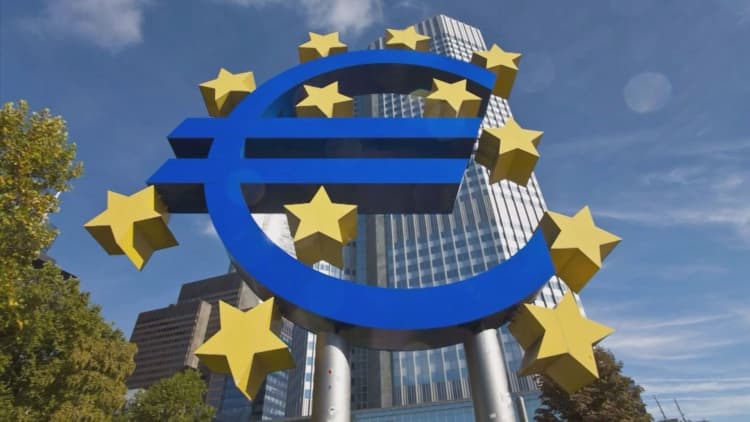The Brexit vote immediately sparked speculation about which country may be the next weak spot in Europe. And increasingly, it's clear the answer may be Italy.
Seventeen percent of bank loans in Italy are bad, according to a Monday report in the Wall Street Journal. That figure, which comes out to a combined 360 billion euros ($401 billion) in bad debt, is more than three times the bank loans that were bad in the U.S. on a percentage basis at the height of the financial crisis.
The report comes as investors are already on edge due to an upcoming referendum on sweeping political changes and a report suggesting that Italy could be prepared to bypass European banking regulations.
The Financial Times reported Sunday that Italy might "defy the EU (European Union) and unilaterally pump billions of euros into its troubled banking system if it comes under severe systemic distress … despite warnings from Brussels and Berlin over the need to respect rules that make creditors rather than taxpayers fund bank rescues."
Citing "several officials and bankers familiar with the plans," the FT said Italy's threat had raised alarm along Europe's regulators "who fear such a brazen intervention would devastate the credibility of the union's newly implemented banking rule book during its first real test."
A spokesman for Italy's Prime Minister Matteo Renzi denied the report, saying "Italy has no intention of defying Brussels on the banks. We respect the rules and prefer market solutions for our banks," Reuters reported.
On Tuesday, Italian Economy Minister Pier Carlo Padoan said a precautionary liquidity boost was available for Italian banks if necessary, but not recapitalization, Reuters reported.
Italian banking stocks were among the worst faring stocks on the pan-European STOXX 600 index on Monday and ended mixed on Tuesday.
Italian households hold about 29 billion euros ($32.17 billion) worth of bank-issued bonds that are subject to being written down or converted into equity in case those banks need to rescue themselves through a so-called "bail-in," according to an April report from the Bank of Italy.
Those regular pensioners and depositers who have invested in higher-yielding bonds could, under EU rules, take a haircut in case of a recapitalization. For domestic political reasons, Renzi wants to avoid that outcome, which has set him at odds with the Union.

Shares of Banca Monte dei Paschi di Siena (BMPS) tumbled on Monday and declined more than 19 percent on Tuesday. Trade was halted at times, according to Reuters. This came after the European Central Bank told BMPS on Monday it must cut the bad loans on its books by 2018. BMPS is believed to be the oldest bank in the world and is one of Italy's largest financial institutions.
Italy's Ubi Banca and Unicredit pared Monday's sharp losses on Tuesday, while Banca Popolare dell'Emilia Romagna closed roughly flat.
"The fact is, the Italian government is up the proverbial creek without a paddle with its banks, unable to bail them out and stuck with a portfolio of up to 360 billion euros ($400 billion) of non-performing loans that are strangling the life out of the Italian economy," Michael Hewson, chief market analyst at CMC Markets, said in a Tuesday note.
"Of those loans, (BMPS) it is estimated, has about 48 billion euros worth, and with a market capitalization of about 1 billion euros, it's not hard to see where its problems lie," he added.
The U.K.'s Brexit referendum has injected greater uncertainty into European growth forecasts, including Italy's. That in turn has created worries about higher loan losses at the country's banks, coupled with falling government bond yields that further hurt financial institutions' margins.
EU banking union rules are designed to shift losses on to shareholders, bondholders and large depositors rather than taxpayers in the event of another financial crisis like the one experienced in 2008, when taxpayers in some countries bore the brunt of collapsing banks having to be rescued by national governments.
Italy's banking system is considered to be one of the most vulnerable in the euro zone with a high level of non-performing loans (NPLs) — estimated to total 360 billion euros ($400.7 billion) — overshadowing the sector.
Societe Generale's global research analysts led by Patrick Legland noted on Monday that Italy's somewhat sclerotic banking system was "still fragile," facing "specific headwinds related to the disposal of their NPL market, while bankruptcy processes and time for repossessions deter investors."
Renzi makes a gamble
As well as rising financial risks, Italy is also facing potential political instability in the coming months when it is due to hold a referendum on constitutional reform, a vote seen as a make-or-break event for Prime Minister Renzi, by the end of October.
Former Prime Minister Mario Monti told CNBC at the weekend that the referendum was a "gamble." "It is true that Mr. Renzi made a bit of a gamble by unnecessarily putting his prime ministership on the line (in the case that) he loses the referendum," Monti told CNBC at a conference in Aix-en-Provence in France.

The referendum is aimed at reforming (and reducing the power of) the Italian Senate and is designed to make it easier to govern. Deadlock in the lawmaking process is a persistent bugbear between the lower and upper houses of parliament in Italy, making attempts at reform a slow, tortuous process at a time when Italy's fragile economy has needed it most. Italy emerged from almost two years of economic contraction in May 2015 but could still be vulnerable to a political shock should the referendum fail.
Citi analysts said in a note at the weekend that Italy's constitutional referendum was "probably the single biggest risk on the European political landscape this year among non-U.K. issues, as PM Renzi's political future may be tied to the outcome of the referendum."
Analysts Tina Fordham, Ebrahim Rahbari, Giada Giani, Guillaume Menuet and Christian Schulz said that the vote is risky coming amid a rise in anti-establishment, populist sentiment, a factor that played a part in the recent U.K. referendum in which a slim majority voted to leave the EU.
"(The vote) raises the risk of Renzi-exit at a time when the upstart 5-Star Movement (M5S) are riding high in the polls and with Italy having among the highest levels of Eurosceptic sentiment," the analysts said.
"If Renzi loses the referendum and resigns, the resulting domestic political instability could well trigger significant financial volatility in Italy and Europe, due to the lack of obvious alternative leaders and/or the rising likelihood of the anti-establishment M5S party entering the next government. Recent polls on the referendum outcome and the poor performance of Renzi's PD (Partito Democratico) party suggest that it is far from assured that the referendum will go Renzi's way," they warned.
—CNBC's Katy Barnato, Ted Kemp and Michelle Caruso-Cabrera contributed to this report. Follow CNBC International on Twitter and Facebook.


